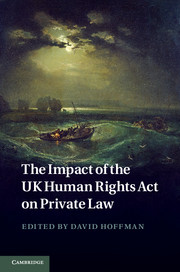Book contents
- Frontmatter
- Contents
- Contributors
- Foreword
- Preface
- Acknowledgements
- Table of cases
- Table of statutes
- Table of statutory instruments
- Table of European Union Legislation
- Abbreviations
- 1 Introduction
- 2 Mapping horizontal effect
- 3 Public authorities: what is a hybrid public authority under the HRA?
- 4 Statute law: interpretation and declarations of incompatibility
- 5 Precedent
- 6 Tort design and human rights thinking
- 7 Privacy: the development of breach of confidence – the clearest case of horizontal effect?
- 8 Nuisance
- 9 Defamation
- 10 Discrimination law
- 11 Damages: private law and the HRA – never the twain shall meet?
- 12 Property and housing
- 13 Commercial law
- 14 Restitution
- 15 Insolvency
- 16 Employment law
- 17 Civil procedure: Article 6 – a welcome boost to the development of English procedural law?
- 18 Conclusions
- Index
- References
17 - Civil procedure: Article 6 – a welcome boost to the development of English procedural law?
Published online by Cambridge University Press: 05 November 2011
- Frontmatter
- Contents
- Contributors
- Foreword
- Preface
- Acknowledgements
- Table of cases
- Table of statutes
- Table of statutory instruments
- Table of European Union Legislation
- Abbreviations
- 1 Introduction
- 2 Mapping horizontal effect
- 3 Public authorities: what is a hybrid public authority under the HRA?
- 4 Statute law: interpretation and declarations of incompatibility
- 5 Precedent
- 6 Tort design and human rights thinking
- 7 Privacy: the development of breach of confidence – the clearest case of horizontal effect?
- 8 Nuisance
- 9 Defamation
- 10 Discrimination law
- 11 Damages: private law and the HRA – never the twain shall meet?
- 12 Property and housing
- 13 Commercial law
- 14 Restitution
- 15 Insolvency
- 16 Employment law
- 17 Civil procedure: Article 6 – a welcome boost to the development of English procedural law?
- 18 Conclusions
- Index
- References
Summary
In his recent work on civil procedure, Zuckerman suggested that the introduction of the HRA has had, or rather ought to have, a salutary and beneficial effect on civil justice. As he put it:
The need to examine English procedure in the light of Convention Art. 6 gives a welcome boost to the development of English procedural law.
Is this correct, or has the HRA and through it the introduction of Article 6 of the Convention into English law had little or no effect on the development of procedural law? That is the question examined here. At first glance it might be thought that Article 6 ought to have had a significant impact. Under the terms of section 3(1) of the HRA the courts are required to interpret and give effect to primary and secondary legislation in a way that is compatible with the various Convention rights. Equally, as public authorities, it is unlawful, under the terms of section 6(1) and (3) of the HRA, for courts to act in any way that is incompatible with a right set out in the Convention. This requires that the court itself in its procedure give effect to the Convention rights (procedural horizontality). In the light of these requirements it might be thought that individuals resorting to litigation before the courts might well expect to benefit from a new Article 6-compliant approach to their procedural rights than was discernible before 2 October 2000.
- Type
- Chapter
- Information
- The Impact of the UK Human Rights Act on Private Law , pp. 360 - 378Publisher: Cambridge University PressPrint publication year: 2011



